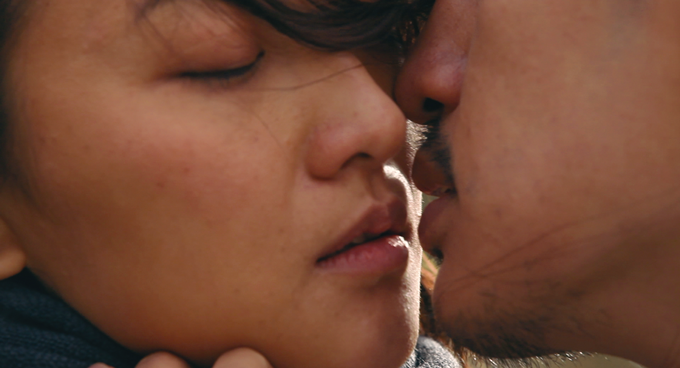VIFF '13: Of All These Friends and Lovers
 Bends
Bends Carina Lau turns in a superb performance as a well-heeled Hong Kong housewife who, suddenly (though perhaps not entirely unexpectedly?), has the economic rug pulled out from underneath her. If this debut feature by Flora Lau feels decidedly more polished and assured than most debut features, that's due in large part to both Carina Lau bringing the movie-star goods and ever-dependable DP extraordinaire Christopher Doyle following each eye-popping composition with another more gorgeous. It's a one-two punch that would no doubt leave other neophyte filmmakers feeling more than a little jealous.
Longing for the Rain The program guide for Yang Lina's film promised something "unprecedented in Chinese cinema: a truly erotic depiction of female desire, shot from a woman's point of view." In execution, the film is almost as radical as that pull-quote would suggest. Initially,
Longing for the Rain felt like a reaction to the
Fifty Shades phenomenon--the sexually frustrated protagonist pops some porn into the DVD player while her husband and daughter are out for the day, receives a vibrator as a "naughty" gift from a girlfriend, etc.--Chinese only insofar as the story is playing out in Beijing, which, in the early goings, seemed (pointedly) like it might just as well be New York, London, or Tokyo. As the film progresses, however, it takes on an ethnographic specificity that serves to steer the narrative in strange, unexpected directions. The final act--set in a remote Buddhist commune--feels curious and somewhat unsatisfying, yet completely appropriate in these respects.
Our Sunhi Wherein Hong Sang-soo tackles the classic trope about the moody-elusive-charming young woman whom no male who makes her acquaintance can seem to resist. It could be, say, Sooki in
True Blood. Cameron Diaz's Mary. Or Audrey Hepburn at the peak of her waifish prowess. But here it's Sunhi, equal parts might-be-smart aspiring artist and blank slate, ripe for the projection of romantic, idealistic notions by her assortment of male admirers. Hong handles this familiar material with a lightness and wit that renders it very nearly fresh. It's a pleasure to watch, from its opening moment to its last. Yet beneath its breezy comic surface, there is the subtlest undercurrent of melancholy here, emanating not least from the distaff center of attention. "Our" Sunhi, after all, has to shoulder the weight of all that smitten affection, which Hong wisely realizes might be a less enviable, more burdensome task than inferior rom-coms prefer to let on.
3x3D Of course the Godard entry was the reason this omnibus was a must-see. Somewhat paradoxically, though,
The Three Disasters is only essential viewing for serious Godard completists, and yet I'm not so sure that those completists will find anything particularly new here--the 3D format notwithstanding--in relation to his late-career body of work. We shall see; I'm certainly not anticipating the forthcoming
Farewell to Language any less eagerly after this teaser. Surprisingly, it was the Peter Greenaway effort,
Just in Time, that stole the show for me. Greenaway picks up from where he left off in recent work like
Rembrandt's J'Accuse, but rather than re-treading the same meta-historical territory to similar effect, he utilizes the distinctive quirks of 3D to push the thematic points he's pursuing further while fruitfully reformulating them. To his credit, Greenaway seems neither intimidated by the technology nor constrained by the brief runtime, which lends his entry a dexterous vitality that Godard's interesting work-in-progress ultimately lacks. Edgar Pera's
Cinesapiens, meanwhle, is insufferable trash. Had it not been sequenced in the middle of the triptych (preceding the Godard), I would have walked out before it hit the five-minute mark.
Wolf Children I must admit, in the interests of full disclosure, that I'm not an anime guy. To be sure, I enjoy and/or admire the same small canon of Japanese animated features that other non-anime people enjoy and/or admire: most of Miyazaki's films, a few other Ghibli titles, the too-small oeuvre of the brilliant, sadly departed Satoshi Kon. But press me beyond these mostly safe picks and my (admittedly, probably at least partly unfair) genre prejudices become apparent. Happily, I enjoyed
and admired Hosoda Mamoru's
Wolf Children considerably more than I expected to, even while a) commenting to Teresa, during the film's poignant, largely "realistic" opening section, that
Wolf Children would be better without its fantasy conceit of people who can transform into wolves; and b) finding distractingly silly the (for lack of a better word) "romantic" appearance of the adult wolves that the titular children grow into, which, in my view, seemed representative of the grating anime cliches that Mamoru mostly manages to eschew.
